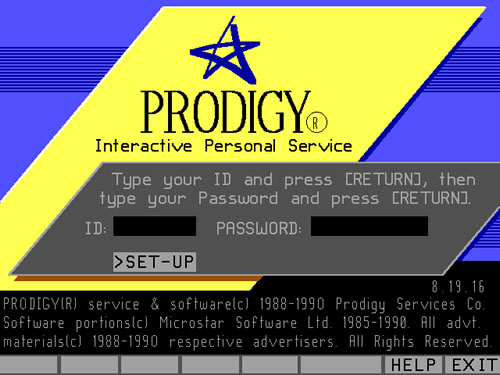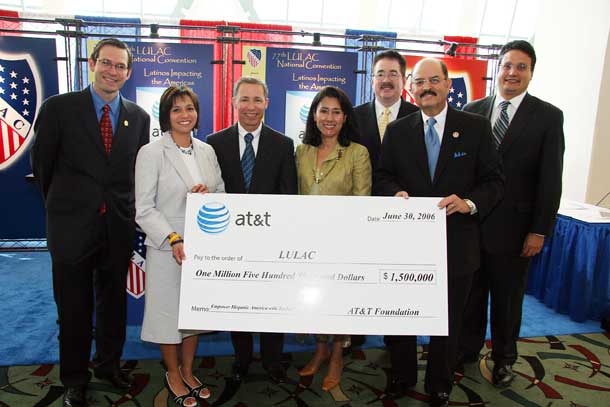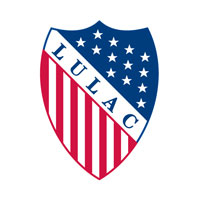 Sometimes you have to wonder who telecom front groups hire to push their agenda. In the Stop the Cap! e-mail box came a news tip last week that a new study proved beyond doubt that passing Net Neutrality would put up to 1.5 million jobs at risk by the year 2020. Just as bad, the study warns, broadband investment would plummet as a result, causing an investment retreat worth up to $5 billion dollars. They thought I should know.
Sometimes you have to wonder who telecom front groups hire to push their agenda. In the Stop the Cap! e-mail box came a news tip last week that a new study proved beyond doubt that passing Net Neutrality would put up to 1.5 million jobs at risk by the year 2020. Just as bad, the study warns, broadband investment would plummet as a result, causing an investment retreat worth up to $5 billion dollars. They thought I should know.
All of this ruinous news results from a government that wants to make sure your Internet Service Provider doesn’t block, impede, or censor the traffic of independent websites that don’t pay a protection fee to keep their content online and accessible. What’s that I smell? The easily recognized scent of plastic grass — more astroturfing from a broadband industry intent on keeping broadband regulation as far away from them as possible.
The Employment and Economic Impacts of Network Neutrality Regulation: An Empirical Analysis, by Dr. Coleman Bazelon — working on behalf of something called “The Brattle Group, Inc.,” is a real page-turner. I tore right through it myself.
Just reading the background of Dr. Bazelon rang all sorts of warning bells:
- Dr. Bazelon consulted and testified on behalf of clients in numerous telecommunications matters;
- Dr. Bazelon frequently advises regulatory and legislative bodies;
- Dr. Bazelon was a vice president with Analysis Group, an economic and strategy consulting firm.
More ordinary folks use a different, less fancy term to cover all this: lobbyist tool.
The key finding for the report:
New network neutrality regulations proposed by the FCC could slow the growth of the broadband sector, potentially affecting as many as 1.5 million jobs, both union and non-union, by the end of the decade.
So how does Bazelon come to this conclusion?
The academic literature on possible effects of network neutrality regulation does not provide a consensus view on whether such regulations should be expected to help or harm the broadband sector, although several economists have concluded that such regulation would be harmful.
Many of those economists were paid by the broadband industry to conclude that in their own “reports.” Many of Bazelon’s footnotes reference himself, telecommunications company executives, or other connected parties who have a financial interest in opposing Net Neutrality or broadband regulations.
At the heart of Bazelon’s theory is that content-related jobs, those involving the development of the websites you like to visit to read, listen, watch, or download from, cost more money to create than broadband “dumb pipe” jobs. In other words, if you’re developing iTunes content or a network to stream Netflix movies, your job cost more (and probably pays more) than a line splicer at AT&T who is rolling out 3 Mbps DSL service in Rolla, Missouri.
So, if we penalize content developers with Internet Overcharging schemes or speed throttles that discourage your use of iTunes or Netflix, AT&T can use the savings from dramatically lower demand and hire more people to wire up communities for basic DSL service. That’s okay, because it creates new jobs: “to the extent that the absence of network neutrality regulations leads to a transfer of ‘wealth’ (or sector revenues) from the Internet content sector to the broadband sector, such a transfer would be expected to have a positive impact on employment.”
That’s a great deal for you, right?
Net Neutrality doesn’t impede bigger profits for broadband providers – it just insists that they don’t earn those profits parasitically on the back of someone else’s content. If your cable or phone company owned Netflix, there wouldn’t be an issue. They would provide a service and earn from it. But they don’t, and demand a piece of the pie anyway.
By the way, Bazelon’s myopic report completely misses another fundamental fact. In today’s non-Net Neutral world, large phone companies like Verizon and AT&T have slashed tens of thousands of jobs just fine without pesky Net Neutrality or other broadband regulations getting in the way. It’s like telling a New Orleans resident standing in four feet of water during Hurricane Katrina that if we don’t do something about the levees next year, the city could be flooded.
The author also states the obvious:
Broadband open access and net neutrality regulations are both regulatory interventions aimed at restricting a broadband network owner’s ability to exercise market power. The first acts at a structural level to eliminate any potential market power in the provision of the good; the second acts at a behavioral level restricting the broadband provider’s ability to benefit from any such market power.
Sounds like a plan to me and millions of other consumers who see the results of the industry’s market power workout routine… in the form of ever-increasing monthly bills.
Bazelon is even willing to predict some winners and losers with the FCC’s proposed Net Neutrality regulations:
Under the strict network neutrality regime being considered by the FCC, different Internet content might flourish. In particular, some Internet content is less commercial and generates very little revenue. Content that does not generate much economic value may be advantaged by a network neutrality regime. It is worth noting, however, that such content, by not primarily being engaged in the economy, does not significantly impact employment. Larger commercial sites have the potential of doing better or worse under network neutrality regulations. On the one hand, potentially lower costs of access should benefit them; on the other hand, potentially less developed broadband infrastructure could harm their businesses. With some content winning and some content losing, there is no reason to believe that the total amount of content will be more or less (or more or less valued by Internet users) under one regime or the other. Some business models will do well under one regime, others under the other regime.
In other words, in Bazelon’s world, the formerly level playing field where content is king and website value is decided on its merits is replaced with a corporate-controlled broadband network where only the big, well-financed players will get to play. If you’re CNN or Amazon.com, you’ll have no problem meeting the protection racket prices providers could demand to guarantee your content isn’t blocked or slowed to a crawl. But if you’re a poor blogger, a new business start-up, or use the web to argue for and against various causes, get to the back of the line (if you are allowed in the line in the first place.)
The Internet gets reincarnated as Prodigy, for those old enough to remember using that online service.
Ultimately, Bazelon believes only big broadband providers can create economic success stories in our online future. Making them play by certain rules will kill that success, he argues.
Only one problem – when Bazelon gazes up into the sky, he sees AT&T logos everywhere he looks. That’s because Mobile Future, the group that paid for the study, is yet another creature of AT&T. To hide the fact this is yet another AT&T front group, several of AT&T’s usual friends also turn up on the membership roster. Just a few days after calling out LULAC – the League of United Latin American Citizens for selling out the Latino community to AT&T’s agenda, here they are again — joined at AT&T’s hip as a member of Mobile Future.
A selection of other Mobile Future (brought to you by AT&T) members
 Asian Business Association – No national website, which already makes this suspicious, but the San Diego chapter admits AT&T is a corporate sponsor.
Asian Business Association – No national website, which already makes this suspicious, but the San Diego chapter admits AT&T is a corporate sponsor.
Asian Women in Business – AT&T underwrote their website.
Bump.com – The company is self-described on Mobile Future’s website as “the world’s largest purpose-formed safety, communication and marketing network. BUMP uses safe and convenient voice recognition and ALPR (automatic license plate recognition) to provide drivers worldwide with a communication platform that promotes safety on the roads and builds a unique global network.” They should win an award for puffery. In fact, this “world’s largest” enterprise doesn’t even have a website. It claims it was founded in 2009, but its Facebook page just showed up April 15th of this year with a handful of photos showing… license plates. Why license plates? Because the group’s real aim is to set up a registry of those willing to receive text messages sent by typing in someone’s license plate and quietly linking it to your cell phone.
The Century Council – Public interest group padding. Ask yourself what a group fighting underage teen drinking and driving built from and run by distilleries has to do with mobile broadband, Net Neutrality, spectrum demand, and wireless phone taxes — the primary issues Mobile Future seeks to address.
Climate Cartoons – The group’s CEO is a Washington, DC lobbyist specializing in fighting telecommunications issues. Among Arnold Consulting Group’s “accomplishments:” building a “telecommunications coalition that successfully opposed federal and state ‘Net neutrality’ legislation” and a “cable television coalition that successfully opposed federal, state and local efforts to enact open access broadband regulations.” Need I say more?
Hispanic Technology and Telecommunications Partnership – Another LULAC — follows AT&T policy initiatives around like a friendly puppy. HTTP was busted by Ars Technica when asked whether AT&T had any hand in helping the group draft its opposition to Net Neutrality. HTTP’s Sylvia Aguilera insisted she initiated the drive to oppose Net Neutrality, but was silent on whether AT&T helped draft the letter opposing it.
That’s only halfway down their so-called “coalition” list. You get the point. The only name that truly matters among all of Mobile Future’s members is AT&T because they are the ones spreading the money around to pay for it. At the same time, if AT&T is writing contribution checks to your public interest group, or hiring your consulting/lobbying firm to represent your agenda, those are two compelling reasons for both to hurry on over to sign up for the cause in this, and other astroturf front groups.
On behalf of Climate Cartoons, which purports to “lure people into earth friendly behavior,” please be sure to give all due respect to this latest industry-backed study from Dr. Bazelon by tossing it into the nearest recycling bin.


 Subscribe
Subscribe











